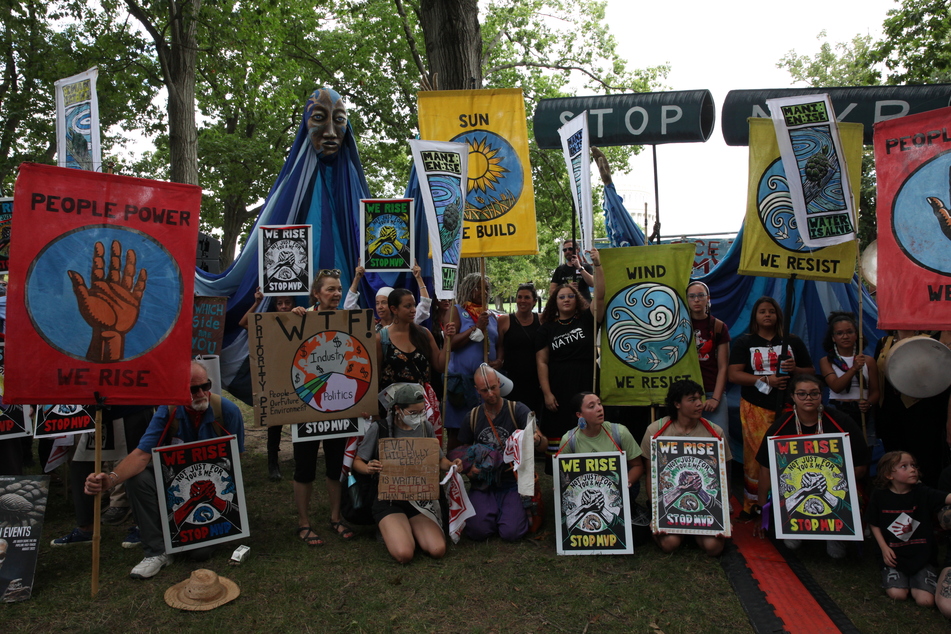We all have seen it – Mountain Valley Pipeline (MVP) has touted their “accomplishments,” spread misinformation that the project is nearly complete, and pushed the messaging that in order to achieve “energy security” the pipeline must be completed. But if you pull back the curtain you’ll find the project for what it truly is – a polluting boondoggle.
The Mountain Valley Pipeline is a 303 mile-long proposed fracked-gas pipeline routed to go over steep slopes and through pristine water resources in Virginia and West Virginia . Construction on the project began in 2018, but the project has had multiple authorizations vacated, resulting in significant delays. To this day major portions of the route have not been completed to full restoration, federal land in the Jefferson National Forest has seen minimal activity fromthe project, the scope of its Southgate extension project continues to be evaluated, leaving its completion highly uncertain and Mountain Valley Pipeline still has more than 400 water crossings left to complete and miles of pipe to lay.
MVP claims the pipeline will be ready in 2023, and the Federal Energy Regulatory Commission (FERC) just gave them four more years to complete it, but here’s a quick snapshot of the reality that faces the pipeline.
- 8+ years of conflict
- 4+ years since construction began
- 36 months where construction was actually permitted
- 26 months of delay due to their own mess and hasty permitting
- 3 federal authorizations missing
- 2 state permits in litigation
- 429 stream and wetland crossings left to construct
- 450+ water quality-related violations
- 56 percent complete to full restoration
Clearly, MVP should not be confident of the pipeline’s completion.
Let’s break this down:
The project was announced more than eight years ago in Summer 2014, and construction began almost five years ago – and they still aren’t even close to finishing. MVP may claim that the project is 90% complete, but this percentage does not consider the most difficult or complex construction work, nor does it incorporate the final stage of construction — “complete to full restoration.” Indeed, there are still approximately 427 interruptions in the mainline. MVP is now reporting in their latest compliance reports that the pipeline is 55.8% complete to full restoration. This may sound like a high percentage, but it leaves out how they have hundreds of difficult water crossings and some of the most challenging construction work ahead, which includes steep terrain.
Additionally, FERC has granted the project four more years to move forward with completion but MVP was originally predicted to be in service by 2018. The expected completion date has been pushed back more than half a dozen times, with Equitrans now claiming the pipeline will be in full service in late 2023. Recently, RBN Energy LLC predicted the pipeline will still be unable to operate by the end of 2024.
Since construction began in February of 2018, there have only been 36 months where construction was actually allowed and 26 months of delay due to rushed and incomplete efforts to obtain the necessary permits. During this time, MVP only had the full suite of required permits from February 2018 through July 2018 – meaning that they have been without at least one permit since then. Not only have the rushed and shoddy permitting processes put the entire project in question, but the blueprint to construct over steep Appalachian slopes further signals that this project has never been compatible with a healthy planet and livable communities.
The pipeline’s incomplete status is further highlighted by the fact that MVP currently lacks authorizations from four federal agencies – the U.S. Forest Service, Bureau of Land Management, U.S. Fish and Wildlife Service, and U.S. Army Corps of Engineers – and is in litigation over Clean Water Act authorizations in Virginia and West Virginia. In recent years, permits authorizing the construction and operation of Mountain Valley Pipeline have been found to be noncompliant with numerous federal environmental laws, including the National Environmental Policy Act, National Forest Management Act, Mineral Leasing Act, Endangered Species Act, and Clean Water Act. These laws play a critical role in protecting communities, waterways, and endangered species.
MVP has lost some of these authorizations twice already, including authorization to cross through the Jefferson National Forest, the Biological Opinion and Incidental Take Statement from the U.S. Fish and Wildlife Service, and the Clean Water Act permit that would authorize hundreds of stream and wetland crossings in Virginia and West Virginia. Additionally, the U.S. Army Corps of Engineers has stated it will not grant a Clean Water Act section 404 authorization while the project lacks a Biological Opinion. To add another nail into the coffin, Mountain Valley Pipeline has violated permit conditions and state environmental laws and regulations more than 450 times.
A total of 429 water crossings remain, 236 in Virginia and 193 in West Virginia, and the first incomplete stream crossing is at milepost 0.7. In other words, the project cannot even move fracked gas one mile before encountering the first of hundreds of incomplete water crossings. Water body crossings are among the most difficult and complicated parts of pipeline construction. This underscores the fact that MVP’s claims that the project is 90% complete are misleading and inaccurate.
MVP’s repeated inability to comply with environmental laws is a result of the project’s poor design and irresponsible project construction. Eight years in, the pipeline’s developers still have not shown that they can build this project while complying with environmental laws and protecting communities.
Call to Action:
We must stop the MVP from ever being built, and protect our communities, and our air and water. Join the Sierra Club and frontline organizations to call on the U.S. Forest Service to protect the Jefferson National Forest and reject the Mountain Valley Pipeline.
